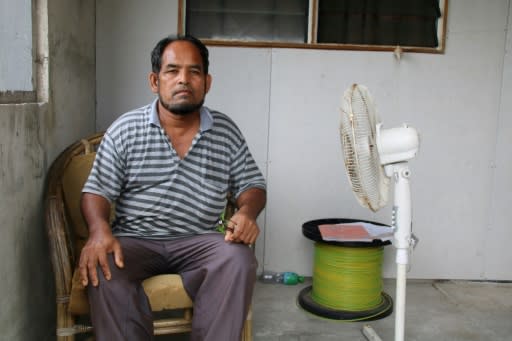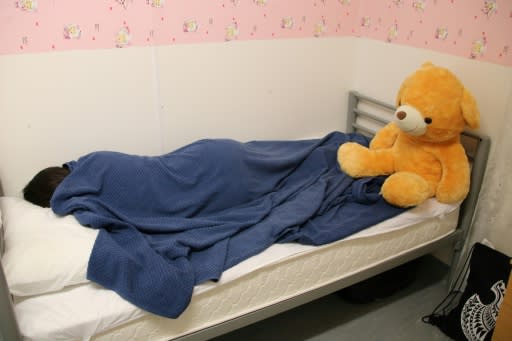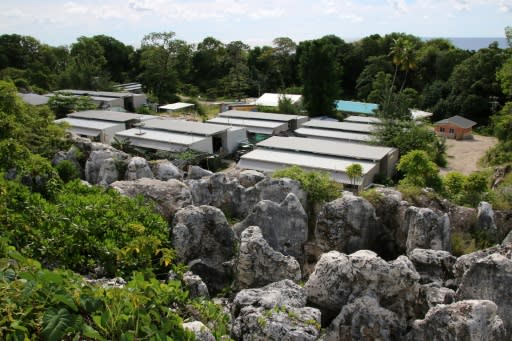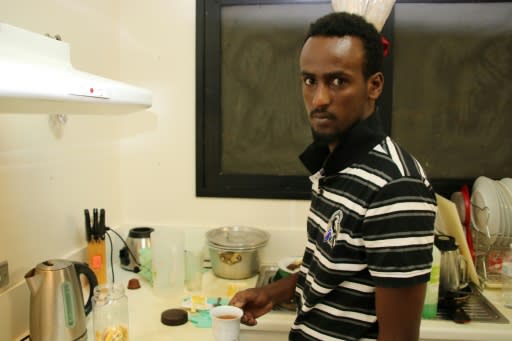Behind the wire in Australia's 'Pacific Gulag'
A cluster of prefabricated huts pokes out of Nauru's sweltering rocky landscape to reveal refugee settlement camp number five, a place defined by desperation and rarely visited by outsiders. Although access to the weed-infested camp is severely restricted, with the Nauru government seeking to prevent journalists from visiting the area, AFP recently managed to enter and speak with detainees. Inhabitants are there against their will, the subjects of a controversial deal between this island's government and authorities in Canberra keen to avoid boat people setting foot on Australian shores. Most are asylum-seekers who tried to reach Australia by sea, but were detained and processed in compounds run by the Nauru government and paid for by Canberra under its hardline immigration policy. A swastika spray-painted on a large water tank alongside initials "ABF" make clear the inhabitants' views on the Australian Border Force, which helps oversee them. Many are willing to speak only on condition of anonymity, but they describe existence on this remote speck of land in the South Pacific as devoid of hope, filled with desperation and of families living with the unbearable cloud of suicide attempts. A refugee from Iran -- who asked not to be named -- worries about himself, but above all about his children. His 12-year-old daughter once doused herself in petrol and threatened to set herself alight, after struggling to cope with spending half a decade and almost half her life on Nauru. "She took the lighter, she was screaming 'Leave me alone! Leave me alone! I want to kill myself, I want to die'," he said. He managed to wrest the lighter from her hands, but the despair that drove the girl to contemplate suicide still hangs over the lives of this family of four. Her 13-year-old brother tells AFP in a monotone: "I have no school, I have no future, I have no life." Somali asylum-seeker Khadar Hrisi watches over his depressed wife like a hawk, afraid even to go to sleep because of her repeated suicide attempts, including one just a few days earlier. He took her to the nearest hospital, which is funded by Australia, but they received little help. "Last night, they called the police and they kicked us (out of)... the hospital," he says. Refugees say medical services are limited and habitually overwhelmed because so many inhabitants suffer from psychological illnesses. Nauru's roughly 900 detainees, including 100 children, often wait years to find out if they have been deemed genuine refugees. Even if they are, Australia still refuses to take them, leaving them stranded in the settlement camps unable to leave the 21 square kilometre (eight square mile) island they have come to regard as an open-air prison. - 'Stolen years' - A Refugee Council of Australia report released last week to coincide with the Pacific Islands Forum summit on Nauru said many detainees' mental health was buckling because they could see no end to their plight. "Those who have seen this suffering say it is worse than anything they have seen, including in war zones... people are broken," the report said. Rights activists say detainees endure harsh conditions including substandard housing in scorching heat, with reports also detailing allegations of physical and sexual abuse. Reporters Without Borders in August also accused the Australian government of failing to defend journalistic freedoms in relation to the camp, which it described as a "Pacific Gulag" and "Australia's Guantanamo". However, Canberra denies mistreatment and says offshore processing is needed to stop deaths occurring when people-smugglers cram asylum-seekers into rickety boats for the treacherous voyage to try to reach Australia. Nauru President Baron Waqa has dismissed the mental health fears and says the refugees can move freely around the island. "They're provided all the services that are available to the Nauruans and we live together very happily," he told reporters. But detainees say their relations with Nauruans are deteriorating and claim that they have been the target of violence and burglary at the hands of locals. The camp is an economic lifeline for Nauru, which has a population of 11,000 and scant natural resources. However, some Nauruans say they have yet to see any benefits from the Australian-bankrolled camps, with one young man telling AFP: "We do not know where this money goes". Many Nauruans live in dire conditions themselves and do not understand why the detainees are complaining. For their part, the refugees say they would be ready to move anywhere, as long as it meant their search for a home was finally over. "The Australian government has stolen five years of our life," said the Iranian father whose daughter attempted suicide and whose son spends his days in depressed resignation. Most the inhabitants in Nauru are there against their will, describing existance in the camps as full of desperation Child refugees are among those who have experienced serious mental health issues and even attempted suicide Naura President Baron Waqa says the refugees and locals "live together very happily" Somali asylum-seeker Khadar Hrisi's wife has already made several suicide attempts





